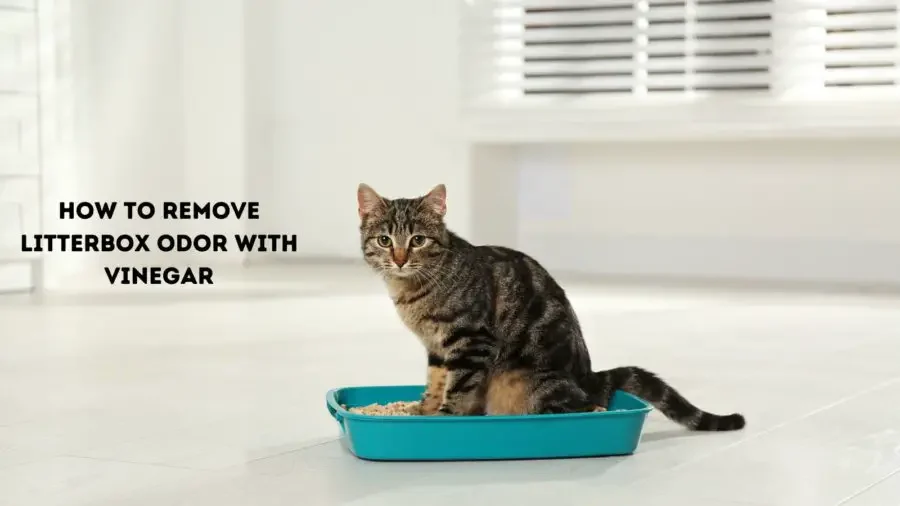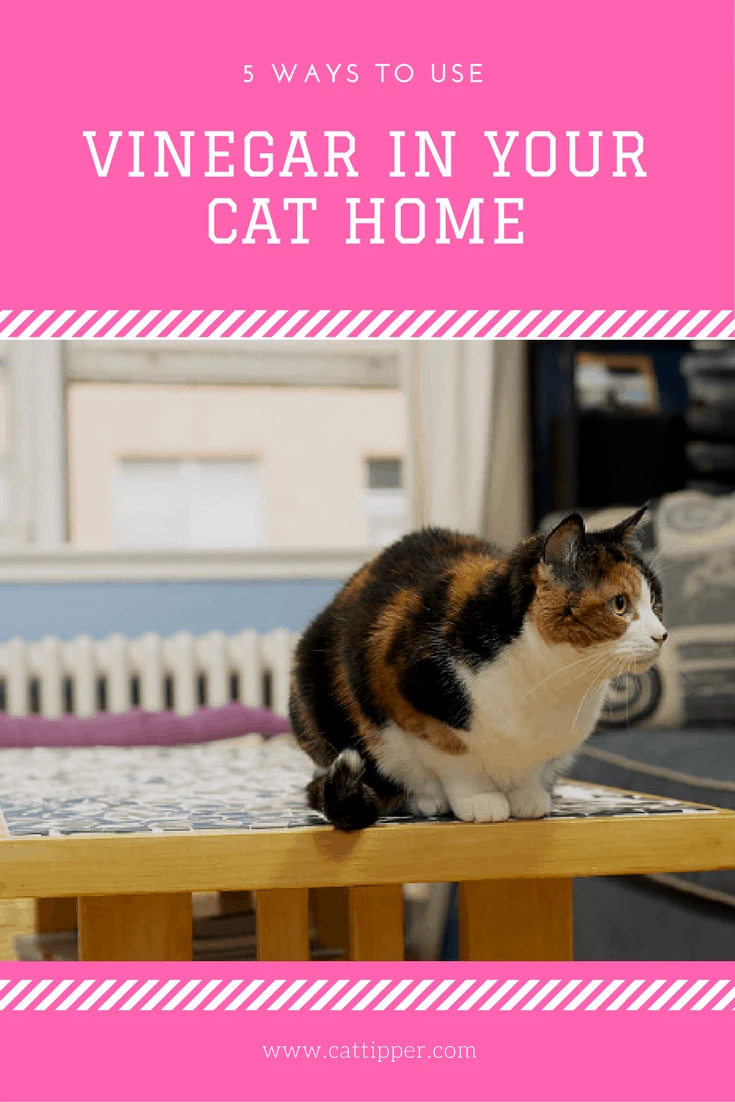I love vinegar as a cleaning supply. It’s an inexpensive, green solution that doesn’t add unwanted chemicals into our home. While the smell of vinegar can be strong, it’s nothing like the chemical/perfume smell of many cleansers that will irritate my asthma. If you’re wondering if vinegar is safe for cats, the answer is yes, it is safe to use as a cleanser in cat households to clean everyday messes without dangerous chemicals.

Do cats like the vinegar smell?
While I love using vinegar for cleaning, cats do not like vinegar. While the scent of vinegar is not a problem for them physically, they just don’t like it. Because of that, vinegar can serve as a natural deterrent if there’s an area you’d like your cats to avoid.
When diluted, the smell is much fainter, and vinegar can be a great tool for cleaning without chemicals. There are many great ways to use vinegar around the house that will keep you AND your cats happy!
Clean deposits out of the pet fountain.
We rely on well water that’s very hard, creating mineral deposits on all the pet bowls and the pet fountain.
Much like you might clean your coffee maker to remove deposits, running vinegar through the pet fountain then rinsing (and rinsing) with clean water prevents it all from getting clogged by lime deposits.
Remove litterbox odor.

We keep our litterboxes in rotation; when we change out the litterbox, the box goes outside for a deep cleaning and airing for days before returning to the house.
For deep cleaning, pour a quarter inch of vinegar in the box and let it sit overnight; when done, pour out the vinegar (great for killing weeds naturally) and wash the litterbox completely to remove the odor.
Vinegar can be a useful tool for everyday litterbox cleaning because of its acidic properties. When mixed with water, vinegar can help to break down and dissolve any urine or fecal matter that may be present in the litterbox.
Additionally, vinegar can help to neutralize any odors that may be lingering in the box, making it more pleasant for both you and your cat. To use vinegar for everyday cleaning of a litterbox, you can mix equal parts water and vinegar in a spray bottle and spray the solution onto the litterbox. Allow the solution to sit for a few minutes, then use a scrub brush or sponge to clean the box thoroughly.
Rinse the box with warm water and allow it to dry completely before refilling with fresh litter.
Mop with vinegar to deter fleas.
Prevent fleas naturally by mopping with vinegar, also a great way to kills bacteria, mold, and germs.
About half a cup of white (or apple cider) vinegar in a gallon of water works great. The smell dissipates quickly.
Pour in the washer’s rinse cycle.
Pour half a cup of white vinegar into the rinse cycle when you’re washing pet bedding to also prevent fleas naturally.
Vinegar will also help freshen your laundry and remove pet smells. Since it is acidic, vinegar can help to neutralize and eliminate odors caused by bacteria and other microorganisms.
Additionally, vinegar can help to soften fabrics by breaking down any detergent or mineral buildup that may be present in the fibers. This can help to make blankets, pet bedding (or your clothing) feel softer.
Vinegar can also help to brighten colors and remove stains without dangerous chemicals, making it a versatile and useful addition to your laundry room.
Spray problem areas with vinegar to repel cats.
Do you have a problem area you’re trying to keep your cat away from when possible? A door facing that she keeps scratching? A plant that you don’t want her near?
Mist the outside of the pot and the general area (but not the plant) with undiluted white vinegar (so the smell is much stronger than mopping water). The smell with naturally deter your cat from the area. Don’t get the vinegar on the plant itself.
If you have an indoor-outdoor cat and are looking for a natural weed killer, vinegar is also your solution. White vinegar can kill plants if it is applied directly to the leaves or stems. The acetic acid in vinegar can damage and dry out plant tissue, leading to wilting and death.
More Posts You Might Like
How to Get a Cat to Use a Scratching Post
Cleaning Pet Stains: Spot Shot Pet Review
How to Remove Cat Pee from Carpet, Laminate Flooring and More
Pin it to remember

- Are Eclipses Dangerous to Cats? - March 4, 2024
- 80 Names for Cats with Spots and Speckles - March 3, 2024
- Free Printable Cat Valentine Coloring Pages - January 31, 2024
